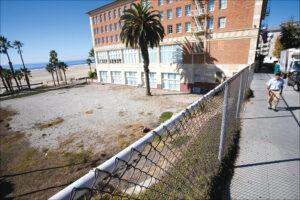
CITY HALL — City officials hope to seal the deal on a real estate transaction over four years in the making Tuesday which would divest City Hall of beachfront property on Ocean Way for a cool $13.15 million.
Under the terms of the agreement, Edward Thomas Hospitality Companies (ETC) would buy the half-acre vacant lot at 1920 Ocean Way and close escrow on the transaction in a quick five days.
That's considerably shorter than the 30- and 60-day escrow periods offered by the next highest bidders and exactly what City Hall was looking for, said Andy Agle, director of the Department of Housing and Economic Development.
The money from the sale will go straight to the Citywide Housing Trust Fund to pay for affordable housing production, an oft-stated goal of City Hall which suffered a blow this year when state government dissolved the primary source of funding for affordable housing — redevelopment agencies.
One bid came in higher, but the buyer wanted the full amount of the money conditional on getting certain entitlements on the property, which could be a lengthy process, Agle said.
"Pricing and timing were critical," Agle said. "With the end of (the Redevelopment Agency) we have a lot of uncertainty even about current projects, let alone any future projects."
ETC was also a motivated buyer, said Tom Larmore, a land use attorney with the local firm Larmore Harding Kutcher and Kozal which worked with ETC on the deal.
The lot is immediately adjacent to Casa del Mar, a luxury hotel owned by the company along with Shutters on the Beach.
"What goes in there is very important to them, not only for quality, but design and how it impacts the hotel and so forth," Larmore said.
On the face of it, what can go on that property is highly restricted. The area is zoned R4, a designation that allows fairly dense residential development which equates to one unit for every 900 square feet, according to a city staff report.
A measure approved by voters in 1990 called Proposition S prohibited further hotel development west of Ocean Avenue — generally excluding the Santa Monica Pier — and any development will have to go before the Coastal Commission as part of its approval process.
That level of uncertainty made valuing the property difficult, Larmore said.
In general, a developer will consider the land value alongside the annual return on the property, but that varies depending on what you can build.
"That's one of the things that made it challenging for everybody," Larmore said.
It's possible that the company will build residences with ground-floor retail, although it's not a business model common to ETC.
Beyond the government restrictions are physical ones. The site used to be right next to the water, which makes the land underneath sandy. When the company investigated the site, it also discovered the remnants of an abandoned sewage treatment plant underground, Larmore said.
If the City Council approves the sale on Tuesday, it will be the end of four years of negotiations with ETC.
In 2008, city staff came to the council with a proposal to swap the 1920 Ocean Way lot for a larger lot also owned by the hotel company at 1828 Ocean Ave. City Hall would then have put out a call to developers to build affordable housing on the site.
The two parties had an exclusive negotiating agreement at the time, but the downturn in the economy caused ETC to rethink its approach to the deal, Agle said.
Staff went out to other groups and received 15 offers on the property from 12 different entities. Ultimately, they selected ETC because of its superior bid, quick closing time and demonstrated interest.
The company went out and did all of its investigative work before entering escrow, which is traditionally the time that a prospective buyer would check for flaws in their newest acquisition.
"They did their due diligence before they had a deal to show that they could move quickly," Agle said.
City Hall can be happy with the deal, especially for the price they're getting, Larmore said. He estimated that the company is paying $500 per square foot of land, roughly $200 per square foot more than other residential development.
That will provide much-needed funds for ongoing affordable housing projects, some of which were funded through the now-defunct Redevelopment Agency and have fallen under the scrutiny of officials at the State Department of Finance, Agle said.
The Department of Finance is responsible for reviewing the uses of redevelopment money to determine what it will allow under laws passed by the state Legislature to govern the dissolution of the agencies. If it deems the money ill-spent, the Department of Finance can demand it back.
That could impact funding for affordable housing projects in Santa Monica, some of which are under construction and others have land purchased, Agle said.
ashley@www.smdp.com









